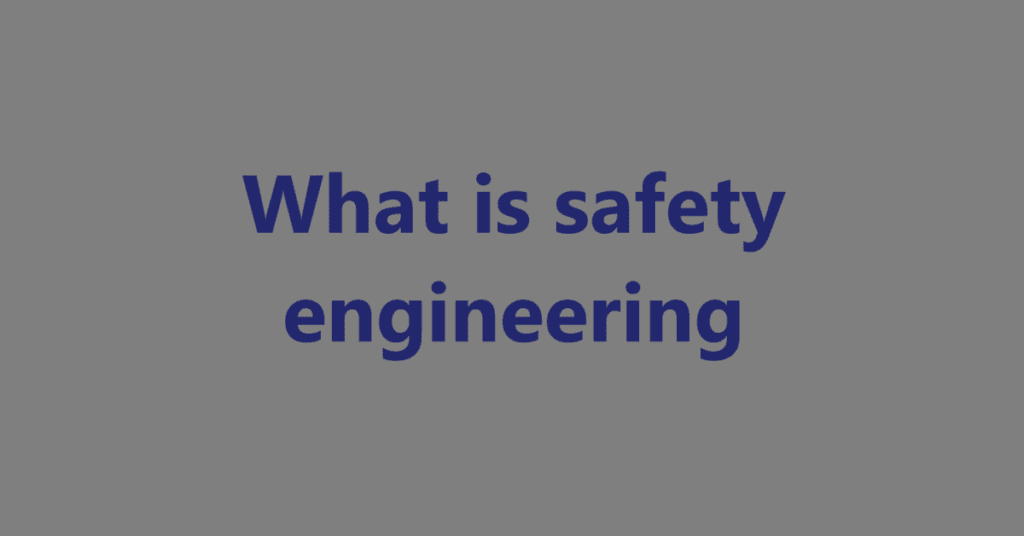Safety engineering is a crucial field that focuses on the identification, assessment, and mitigation of hazards in various environments, including industrial, construction, environmental, and public safety sectors. Here’s a detailed look at the career paths and scopes for safety engineers:
Career Paths
- Industrial Safety Engineer
- Works in manufacturing and production facilities to minimize workplace hazards.
- Responsible for ensuring compliance with safety regulations, conducting risk assessments, and implementing safety protocols.
- Environmental Safety Engineer
- Focuses on environmental protection aspects related to safety.
- Involves assessing the impact of industrial processes on the environment and promoting sustainable practices.
- Construction Safety Engineer
- Specialized in safety management in the construction sector.
- Responsible for risk assessments, inspections, and the development of safety training programs on construction sites to prevent accidents.
- Process Safety Engineer
- Works in chemical and process industries to ensure that processes operate safely and efficiently.
- Involves performing hazard analysis, ensuring regulatory compliance, and developing safety management systems.
- Health and Safety Manager
- Oversees safety programs and policies within an organization.
- Responsible for training employees, conducting safety audits, and fostering a culture of safety.
- Safety Consultant
- Provides expert advice to organizations looking to improve their safety practices.
- May work independently or as part of a consulting firm.
- Regulatory Compliance Officer
- Ensures that organizations adhere to safety regulations and standards set by government bodies.
- Involves keeping abreast of safety laws and frequently conducting audits and inspections.
- Ergonomics Engineer
- Focuses on designing workspaces and tools that fit the physical needs of employees to prevent injuries.
- Involves analyzing workplace layouts and developing ergonomic practices.
Skills Required
- Technical Knowledge: Understanding of safety standards, regulations (like OSHA), risk assessment techniques, and safety management systems.
- Analytical Skills: Ability to analyze risks and develop strategies to mitigate hazards.
- Communication Skills: Proficient in conveying safety information and training employees about safety practices.
- Problem-Solving Skills: Capable of finding innovative solutions to complex safety issues.
- Attention to Detail: Vigilance in identifying potential hazards and ensuring compliance with safety protocols.
Scope of Safety Engineering
- Growing Demand
- With increasing awareness of workplace safety, industries are prioritizing safety, leading to high demand for safety engineers.
- Regulatory bodies continuously update safety standards, necessitating the expertise of safety professionals.
- Diverse Industries
- Safety engineers can work across various sectors, including manufacturing, construction, oil and gas, transportation, healthcare, and environmental management.
- Job Security
- Given the critical nature of safety processes, jobs in this field often offer good stability and security.
- Impact on Society
- Safety engineers play a vital role in protecting lives and ensuring safe workplace environments, contributing significantly to public health and welfare.
- Career Advancement
- Opportunities for career progression are available, including moving into senior management roles, specializing further in safety sub-disciplines, or transitioning into related fields such as safety policy development or education.
- Certifications
- Pursuing certifications like Certified Safety Professional (CSP) or Occupational Health and Safety Technologist (OHST) can enhance job prospects and career advancement.
Conclusion
The career path of a safety engineer is enriching and impactful, with numerous opportunities for growth and specialization. As industries evolve and new challenges in safety emerge, the role of safety engineers will continue to be integral in safeguarding both workers and the environment. Those interested in this field should focus on developing a strong knowledge base, relevant skills, and proactive adaptation to changing safety dynamics.


